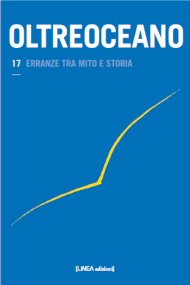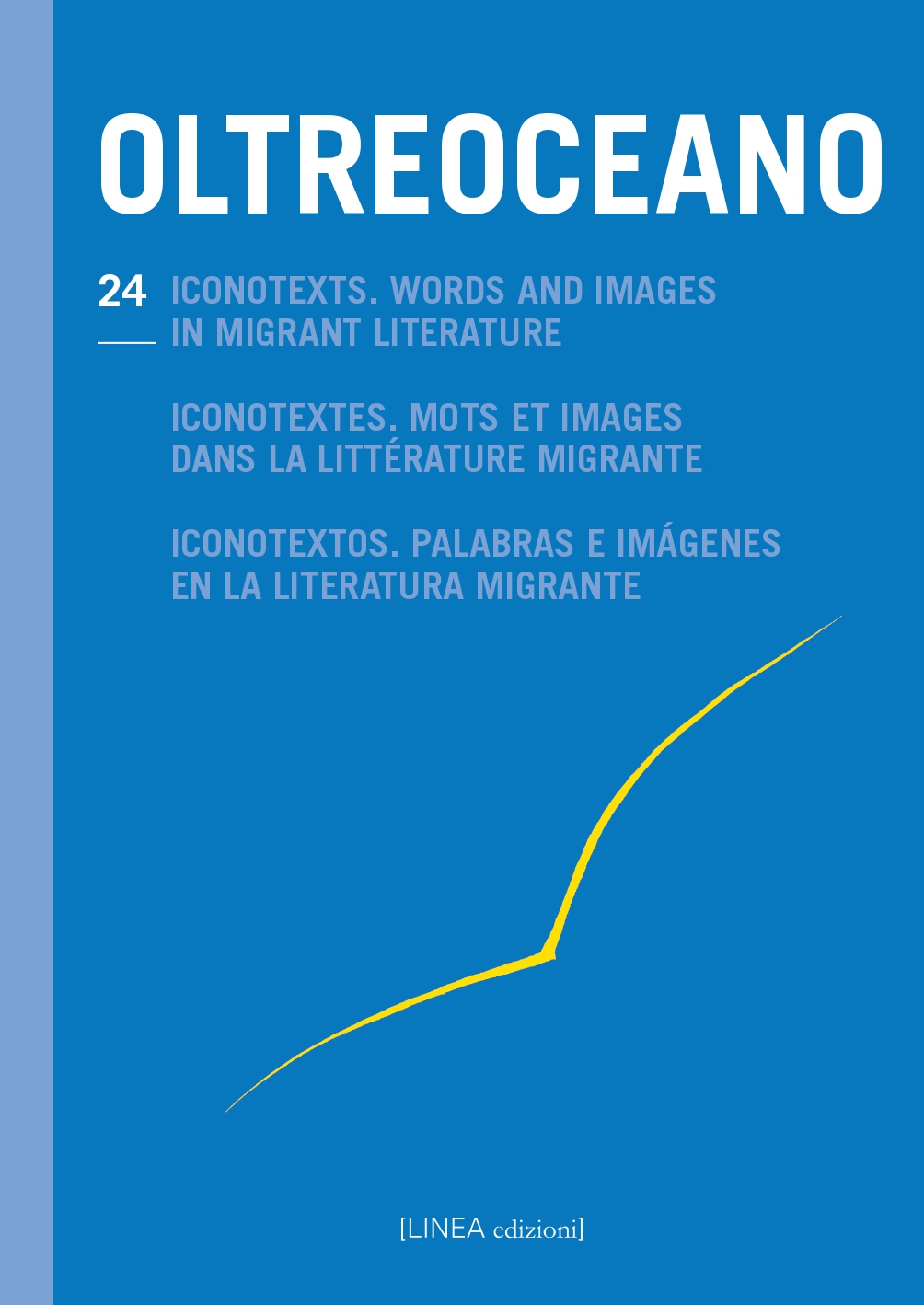About the Journal

«Oltreoceano» is the journal of CILM (International Research Center on Migrant Literatures). It publishes essays in English, French, Italian and Spanish on the literary, linguistic and cultural production of subjects migrating to the Americas.
Founder and Honorary Member
Silvana Serafin (Università di Udine)
Editor-in-Chief
Alessandra Ferraro (Università di Udine)
Deputy Editor-in-Chief
Rocío Luque (Università di Trieste)
Associate Editors
Daniela Ciani Forza (Università Ca' Foscari Venezia), Simone Francescato (Università Ca' Foscari, Venezia), Rocío Luque (Università di Trieste), Emilia Perassi (Università di Torino), Antonella Riem (Università di Udine), Valeria Sperti (Università "Federico II", Napoli).
Editorial Board
Andrea D’Urso (Università di Sassari), María del Carmen Domínguez Guitérrez (Università di Padova), Federica Fragapane (Università di Trieste), Fabio Libasci (Università dell'Insubria), Enrico Mariani (Università Ca’ Foscari, Venezia), Nicola Paladin (Università "Gabriele d'Annunzio” di Chieti-Pescara), Chiara Patrizi (Università di Bologna), Elena Ravera (Università di Udine), Giada Silenzi (Università di Udine), Alessia Vignoli (Università Warszawski, Polonia).
International Advisory Board
Trinidad Barrera (Universidad de Sevilla, España), † Giuseppe Bellini (Università di Milano), Michele Bottalico (Università di Salerno), Francesca Cadel (Calgary University, Canada), Antonella Cancellier (Università di Padova), Adriana Crolla (Universidad del Litoral, Argentina), Domenico Antonio Cusato (Università di Catania), Águeda Chávez García (Universidad Nacional Autónoma de Honduras, Honduras), Biagio D’Angelo (Universidade de Brasília, Brasil), Gilles Dupuis (Université de Montréal, Canada), Simone Francescato (Università Ca’ Foscari Venezia), Cristina Giorcelli (Università di Roma Tre), Rosa Maria Grillo (Università di Salerno), Rainier Grutman (Université d’Ottawa, Canada), Dante Liano (Università Cattolica del Sacro Cuore, Milano), Renata Londero (Università di Udine), Roberta Maierhofer (Karl-Franzens-Universität Graz, Österreich), Adriana Mancini (Universidad de Buenos Aires, Argentina), Andrea Mariani (Università "Gabriele d’Annunzio” di Chieti-Pescara), José Francisco Medina Montero (Università di Trieste), Elisabeth Nardout-Lafarge (Université de Montréal, Canada), Rocío Oviedo (Universidad Complutense de Madrid, España), Joseph Pivato (Athabasca University, Canada), Eduardo Ramos-Izquierdo (Sorbonne Université, France), Susanna Regazzoni (Università Ca’ Foscari Venezia), Carmen M. Rivera Villegas (Universidad de Puerto Rico, Puerto Rico), Biancamaria Rizzardi (Università di Pisa), Patricia Rosas Lopátegui (University of New Mexico, USA), † Filippo Salvatore (Université Concordia, Canada), Manuel Simões (Portugal), Sherry Simon (Université Concordia, Canada), Monica Stellin (Sir Wilfrid Laurier University, Canada), Edwige Tamalet Talbayev (Tulane University, New Orleans, USA).
Web Manager
OJS: Rocío Luque (Università di Trieste)
OpenEdition: Giada Silenzi (Università di Udine)
Scopus: Nicola Paladin (Università “Gabriele d'Annunzio” di Chieti-Pescara)
International Exchange
Rocío Luque (Università di Trieste)
Esecutive Board
CILM-Centro di ricerca Internazionale Letterature Migranti Università degli Studi di Udine
Via Palladio 8, 33100 UDINE-ITALIA http://www.uniud.it/it/ricerca/progetti/cilm
info: oltreoceano.digr@uniud .it, alessandra.ferraro@uniud.it, rluque@units.it
-------------------
Journal rated Class A for the 10/ANGL-01 (ex 10/I1); 10/FRAN-01 (ex 10/H1); 10/SPAN-01 (ex 10/L1) areas by ANVUR (Italian National Agency for the Evaluation of Universities and Academic Institutions).
-------------------
Indexes and databases in which «Oltreoceano» is present: ACNP, BASE, Biblioteca virtuale Miguel de Cervantes, CIRC, CROSSREF,DIALNET, ERIH PLUS, EZB/ZDB, FATCAT, GOOGLE SCHOLAR, MIRABEL,MLA, OPEN ALEX, Open Edition, Portal del Hispanismo, PLEIADI, REBIUN, ROAD, SCOPUS, SUDOC, SWISSCOVERY, THE KEEPERS, TITOLO DOI, Torrossa Editoria Italiana Online, WORLDCAT, ZDB.
-------------------
Recipient of the literary prize “La letteratura delle Radici” in 2023 (category: literary journals), awarded by the Italian in Italy ETS Association (www.italianinitaly.org).
(www.italianinitaly.org).
-------------------
«Oltreoceano» adotta una dichiarazione di etica delle pubblicazioni e di cattiva condotta nelle pubblicazioni (basata sulle raccomandazioni di Elsevier e sulle linee guida di buone pratiche per gli editor di riviste di COPE).
------------------------------------------------------------------------
Current Issue

The essays collected in this issue explore the iconotext as an intermedial device in which word and image do not merely coexist but enter into a dynamic relationship of reciprocal semantic determination. Starting from the awareness that the migratory experience entails an identity rupture — loss of language, memory, and roots — the contributions examine how such a condition is translated into verbo-visual practices structured through montage, ellipsis, archive and counter-archive, paratextual thresholds, and the materiality of the page. Intermediality thus emerges not as an ornamental strategy, but as an epistemological resource capable of interrogating regimes of visibility and contemporary forms of memory.
Through the analysis of graphic memoirs, phototexts, wordless narratives, illustrated editions, and editorial practices, the volume outlines a thematic constellation that brings autobiography, testimony, and the construction of the self into dialogue, showing how displacement also operates as a formal principle. A further line of inquiry addresses archives and the politics of the gaze, highlighting the ethical and postcolonial implications of the photographic document and the counter-narrative strategies that redefine its use. Particular attention is devoted to the material devices of the work — supports, layout, rhythm, paratexts — and to the pragmatic effects generated by the interaction between codes. Taken together, the essays propose a “double-entry” reading methodology that combines formal analysis with historical and cultural inquiry, positioning migrant literature as a privileged observatory for understanding contemporary transformations of the verbo-visual imaginary.












